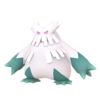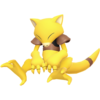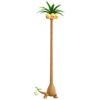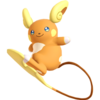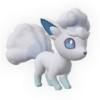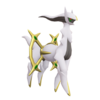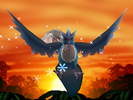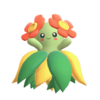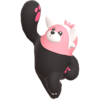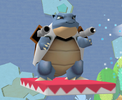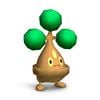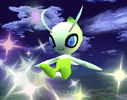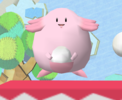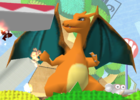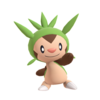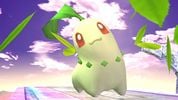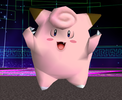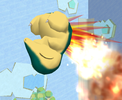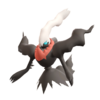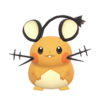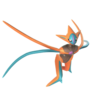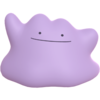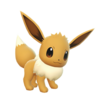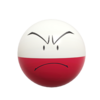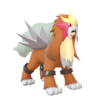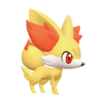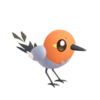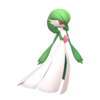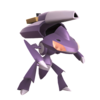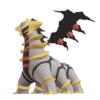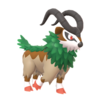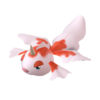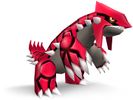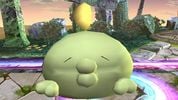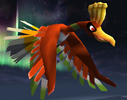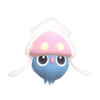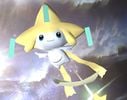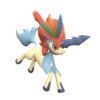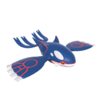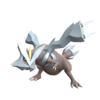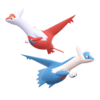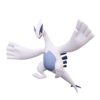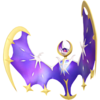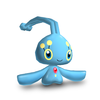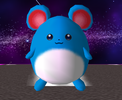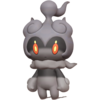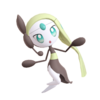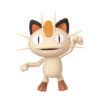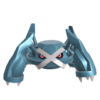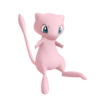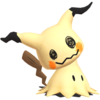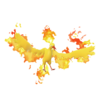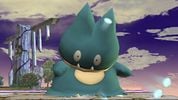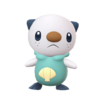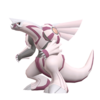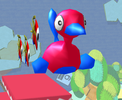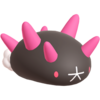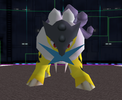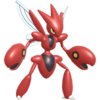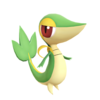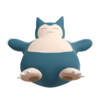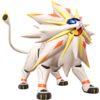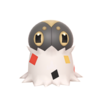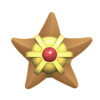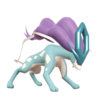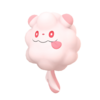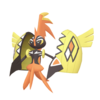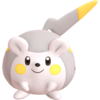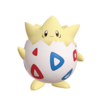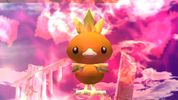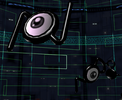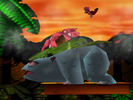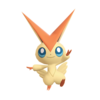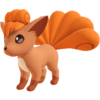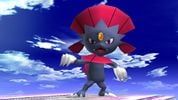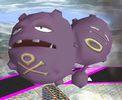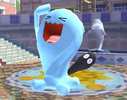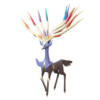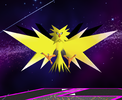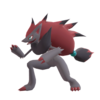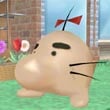List of Super Smash Bros. series items
This is a list of items in the Super Smash Bros. series, all of which are interactable with the Super Mario franchise to some capacity.
List of items[edit]
| Image | Name | Games | Origin series | Description |
|---|---|---|---|---|
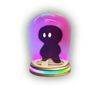 |
Assist Trophy | Super Smash Bros. | It summons one of various possible characters to temporarily assist whoever used the item. | |
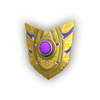 |
Back Shield | Kid Icarus | A Back Shield is placed behind a fighter, protecting them from most attacks from behind, except for grabs and piercing moves. The Back Shield breaks after enough damage. | |
 |
Banana Gun | Super Smash Bros. | It is only possible to launch as a projectile once before it becomes a Banana Peel. | |
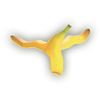 |
Banana Peel | Super Mario | A fighter can trip on a Banana Peel, inflicting minor damage. | |
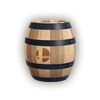 |
Barrel | Super Smash Bros. | A container that can roll on the ground and release some items upon breaking. | |
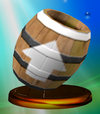 |
Barrel Cannon | Donkey Kong | Rotates and then blasts the fighter in a random direction. | |
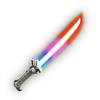 |
Beam Sword | Super Smash Bros. | Also known as Energy Blades,[1] or light sabres,[2] can be used to slash opponents, inflicting damage and knockback. A Beam Sword can also be thrown as a projectile.
Beam Swords were originally composed of a long pink blade of energy with an extended reach in the original Super Smash Bros. The Beam Sword was given a purple hue and a shorter blade in Super Smash Bros. Melee, though the length varies by character and attack, being the longest when used during a smash attack. Both games use sound effects similar to Star Wars lightsaber sounds in the Japanese release. The Beam Sword is a bluish-white in Super Smash Bros. Brawl, still extending when used with a smash attack. Beam Swords were redesigned for Super Smash Bros. for Nintendo 3DS and Super Smash Bros. for Wii U, now having a red- and blue-colored blade and retaining the same length for all fighters; this design was kept for Super Smash Bros. Ultimate. | |
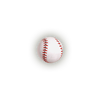 |
Beastball | Super Smash Bros. | It is a baseball that can be thrown, after which it disappears and then reappears near an opponent, targeting them while covered in flames, not unlike a Soccer Ball. | |
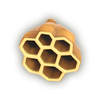 |
Beehive | Animal Crossing | Releases a group of angry bees when broken, damaging other fighters in the process. | |
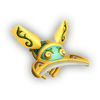 |
Beetle | The Legend of Zelda | When picked up and thrown, the Beetle flies forward, grabbing any opponent it catches and carrying them to the upper blast line and KOing them (often Screen KOs in particular in Super Smash Bros. Ultimate); the speed at which the beetle does this depends on the character's weight, doing it slower for heavier fighters. The target can escape from a Beetle if another fighter attacks it, also causing the beetle to start traveling the opposite direction, as well as making it disappear if attacked enough. A Beetle stops moving and lands upon hitting a wall. | |
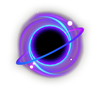 |
Black Hole | Super Smash Bros. | While in midair, it sucks in items, projectiles and other fighter. | |
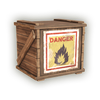 |
Blast Box | Super Smash Bros. | An explosive crate that inflicts 30% damage to any fighters upon breaking, including the user, and breaks immediately upon contact with flames. A Blast Box can be thrown a very short distance. It inflicts anywhere from 10% to 20% damage. The box has a chemical warning sign on it signaling easily ignitable substances. | |
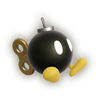 |
Bob-omb | Super Mario | Walks for a while after being spawned. It explodes after a while or when thrown at another fighter. | |
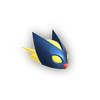 |
Bombchu | The Legend of Zelda | An activated Bombchu moves a single direction, including over obstacles and surfaces other than the ground. A Bombchu explodes if it either touches a fighter or from flames. | |
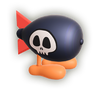 |
Bomber | Kirby | A Bomber begins like a Bob-omb, spawning and walking around. A Bomber is used by holding it upward, followed by an explosion 1.5 seconds later. Fighters closer to the explosion receive more damage, including the user. A Bomber can also explode either after a certain time or from falling off of a surface. | |
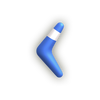 |
Boomerang | Super Mario | A Boomerang can be thrown at a fighter before returning itself to the user. | |
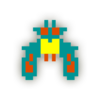 |
Boss Galaga | Galaxian | Boss Galaga flies in a loop before creating a tractor beam that can carry any fighter caught in it beyond the upper blast line. | |
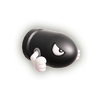 |
Bullet Bill | Super Mario | The fighter changes into a Bullet Bill, charges straight forward, launching away other fighters, though at the risk of bypassing a blast line. | |
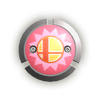 |
Bumper | Super Smash Bros. | Bumpers inflict knockback on any fighter who touches them. They were replaced by Flippers in Super Smash Bros. Melee only. Bumpers were redesigned since Super Smash Bros. for Nintendo 3DS / Wii U to have their outer blue portion changed to purple, and the central part is red with a yellow Super Smash Bros. series symbol. Bumpers stay in a fixed location within the air when thrown, though not in the original Super Smash Bros., in which they fall to the ground instead. One in the Peach's Castle stage is a stage hazard instead of an item. | |
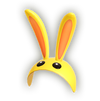 |
Bunny Hood | The Legend of Zelda | Gives the user higher jumps and faster movements temporarily. | |
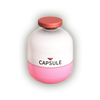 |
Capsule | Super Smash Bros. | Pink and white containers that release an item after being picked up and thrown. There is a 12.5% chance of the capsule exploding upon contact with the ground or a fighter. | |
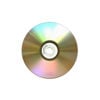 |
CD | Super Smash Bros. | CDs may appear randomly in stages. Obtaining one unlocks a song as part of the My Music, but not if a computer player collects it. Mew drops one when summoned from a Poké Ball, if the player has not collected every CD yet. | |
 |
Cloaking Device | Perfect Dark | The item turns the user almost completely invisible for a short amount of time, although they sometimes flash back into visibility for a split-second. Cloaking Device is only activated permanently in matches in Invisible Melee, as well as for Fox and Falco during the Event Match Slippy's Invention. | |
 |
Cracker Launcher | Super Smash Bros. | Shoots fireworks that explode on contact from either hitting a fighter or the ground. Fighters can walk and jump while holding the Cracker Launcher, and its angle is adjustable with the Control Stick ( | |
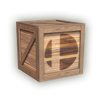 |
Crate | Super Smash Bros. | Crates are container items that can slide along the ground. | |
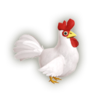 |
Cucco | The Legend of Zelda | Cuccos walk around harmlessly until either attacked, being thrown at a target, or being disrupted by a stage hazard; this results in a flock of Cuccos flying in to attack whoever angered them while also damaging others caught in their range. If a Cucco is provoked by a stage hazard, the flock targets random fighters. | |
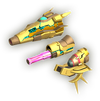 |
Daybreak | Kid Icarus | The Daybreak has three parts to collect before it can be used, and when completed, the Daybreak blasts a continuous laser across the stage inflicts high damage and knockback while ignoring shields. The fighter holding the Daybreak can walk around and jump before firing, and drop it by either grabbing an edge or from enough hits. | |
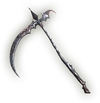 |
Death's Scythe | Castlevania | The user winds back Death's Scythe before swinging it in front; any critically damaged fighter is surrounded by a dark aura. The Death's Scythe instantly KOs opponents when struck at the tip of the blade at 70% with a fully charged smash attack, 80% for an uncharged smash attack, and 120% from a tilt attack. | |
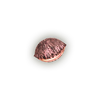 |
Deku Nut | The Legend of Zelda | A Deku Nut can be thrown at opponents, dizzying anyone in range in a manner similar to a shield breaking. Fighters who touch the explosion while in mid-air are blasted away. Deku Nuts explode by themselves after a while, even if held by a fighter. | |
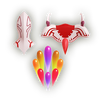 |
Dragoon | Kirby | The Dragoon is broken and collected in three parts, much like the Daybreak. Any fighter can collect the parts, but the Dragoon becomes usable only when one of the fighters has every part. If a fighter is damaged while having a Dragoon part, they often drop it, allowing an opponent to collect the part instead. The fighter with every Dragoon part can aim and then launch themselves, damaging and possibly KOing opponents any opponents hit. The Smash Ball does not appear while the parts are in play, though once the Dragoon is used up, the remaining parts can appear again. In a Team Battle in Super Smash Bros. for Nintendo 3DS / Wii U, the fighter who collected the last piece on a team gets to use the Dragoon.
In Adventure Mode: The Subspace Emissary, the Dragoon appears in a scene where Kirby flies on it straight through the Subspace Gunship, destroying it. | |
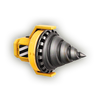 |
Drill | Super Smash Bros. | When used, the drill bit launches across the screen, damaging and carrying any fighters in the path, resulting in potential KOs. The projectile is usable only once, after which its base can be thrown at other fighters. Although classified as a Super Smash Bros. item, the Drill's design resembles that of the Drill Arm from Kid Icarus: Uprising. | |
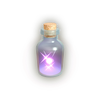 |
Fairy Bottle | The Legend of Zelda | A Fairy Bottle can be picked up by a fighter only if they have 100% or more damage, restoring exactly 100% damage. If the user is not damaged enough, they pick up the Fairy Bottle to throw instead. If the target is critically damaged, the Fairy Bottle still restores their damage meter upon contact. | |
 |
Fake Smash Ball | Super Smash Bros. | The item looks like a Smash Ball, except the lines on the Super Smash Bros. logo are inverted. If broken, the Fake Smash Ball explodes in an "X" formation and inflicts up to 43.2% damage on nearby fighters, launching them away. The movements of a Fake Smash Ball are more focused towards fighters rather than moving around the stage randomly. | |
 |
Fan | Super Smash Bros. | Also called a Paper Fan,[1] the user with the Fan swipes it upon use, dealing damage to opponents. It has low damage output, but attacks quickly and heavily damages shields. An opponent hit by a fan thrown at them will fly straight up in the air. | |
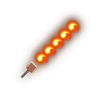 |
Fire Bar | Super Mario | A Fire Bar is held and used like a Beam Sword, but inflicts flame damage and becomes smaller after repeated use. | |
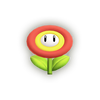 |
Fire Flower | Super Mario | A Fire Flower releases a stream of fire. The item releases only a temporary stream, becoming useless afterward. | |
 |
Flipper | Balloon Fight | Taking the role of Bumpers in Super Smash Bros. Melee only, a Flipper can be picked up by a fighter and thrown, causing it to hover in the air. The Balloon Fight stage includes Flippers as a stage hazard, except these do not disappear after a set amount of time. In both capacities, Flippers spin around and damage and fighter on contact. In moving stages such as Big Blue, Flippers move along with the stage. | |
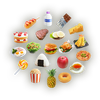 |
Food | Super Smash Bros. | Food in the Super Smash Bros. series are consumable items that restore a little amount of damage when eaten, the number of which depends on the type of food. Food can be revealed from various container items, including Party Balls. | |
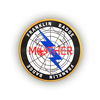 |
Franklin Badge | EarthBound | A Franklin Badge clings temporarily to the user who picked it up, deflecting any projectiles thrown at them. The Franklin Badge is depicted with a background picture of the northern hemisphere on it and a logo of the Mother series, similar to the design of the Franklin Badge packaged with Mother 1+2. | |
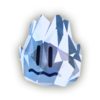 |
Freezie | Super Mario | Freezes any player character on contact, moving them up into the air before thawing out. | |
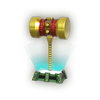 |
Golden Hammer | Super Mario | A variation of the Hammer item with a higher damage output. | |
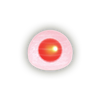 |
Gooey Bomb | Super Smash Bros. | Based on the Motion-Sensor Bomb from Super Smash Bros. Melee, the Gooey Bomb can be attached to surrounding terrain, in addition to opponents. A fighter with a Gooey Bomb attached to them can get rid of it only by touching another opponent, passing it over to them instead. A few seconds after being placed, the Gooey Bomb explodes, damaging anyone nearby. | |
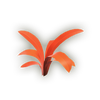 |
Grass | Super Mario | Appearing from the ground, Grass can be plucked to reveal a random item. | |
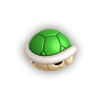 |
Green Shell | Super Mario | When activated, a Green Shell slides in a direction on the ground, damaging fighters who touch it. | |
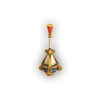 |
Gust Bellows | The Legend of Zelda | The Gust Bellows blows a continuous gust of wind capable of pushing opponents away for a limited time. Gust Bellows can be evaded by either rolling or shielding against it. If a Gust Bellows is thrown while it still has wind, it bounces and blow wind in random directions. | |
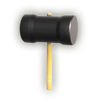 |
Hammer | Super Mario | The user moves the item up and down quickly, dealing lots of knockback any opponents hit. | |
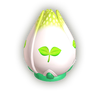 |
Healing Field | Super Smash Bros. | A large bulb that, after being thrown to the ground, opens to create a small green field that heals players inside of it. The fighter who threw the item is healed at 2% damage per half second, whilst others at 1% damage per half second. | |
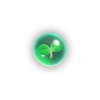 |
Healing Sprout | Super Smash Bros. | A small orb that heals 2% of the user's damage every set amount of time, before disappearing a few seconds later. Healing Sprouts can be transferred to other fighters via contact, attaching itself but still healing them too. Multiple Healing Sprouts can be used by a fighter at the same time. | |
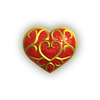 |
Heart Container | The Legend of Zelda | Heart Containers are healing items. Heart Containers restore up to 100% of damage, except in the original Super Smash Bros., where they recover all damage, though the three Heart Containers in Melee's and Brawl' All-Star Modes still recover all damage. A Heart Container cannot be picked up in the original Super Smash Bros. and Melee unless it touches the ground. | |
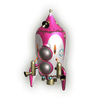 |
Hocotate Bomb | Pikmin | A model of the Hocotate Ship that blasts into the air after being picked up and thrown, potentially carrying opponents that hit it above the upper blast line. The Hocotate Bomb crashes to the ground some seconds later, exploding and damaging any nearby opponents. | |
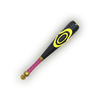 |
Home-Run Bat | Super Smash Bros. | Alternatively spelled Homerun Bat, the item can be grabbed and used to hit other fighters or throw it at them. It is also the item used in Home-Run Contest mode. The Home-Run Bat has a very powerful smash attack that inflicts lots of knockback, almost always KOing fighters in the process, though it does take a few seconds to execute. Fighters hit with the tip of the bat are launched the farthest.
In the first three games, the Home-Run Bat is a regular wooden baseball bat. Later installments color the handle red and golden and the main part black and yellow, as well as adding a golden Super Smash Bros. emblem on the handle end of the bat. | |
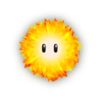 |
Hothead | Super Mario | When thrown, a Hothead travels along every surface of the stage, similarly to a Bombchu, but does flame damage to any opponent on contact. | |
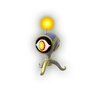 |
Killer Eye | Kid Icarus | The Killer Eye is a turret that shoots lasers in front after being placed on either the ground, a wall, or the ceiling. A Killer Eye starts shooting the opposite direction when hit or shoots lasers up when flipped upward. | |
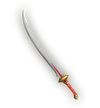 |
Killing Edge | Fire Emblem | A sword that can be picked up and swung forward in front of the fighter, inflicting twice the amount of knockback and damage if it is glowing red and playing the critical hit sound effect from the Game Boy Advance Fire Emblem games if it hits successfully. | |
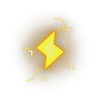 |
Lightning | Super Mario | Shrinks all opponents temporarily when touched, or sometimes the user only. | |
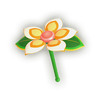 |
Lip's Stick | Panel de Pon | Lip's Stick is a battering item that plants a small flower on the head of the target, inflicting gradual damage. Any character hit continuously causes the flower to grow larger, prolonging the duration it is present and therefore causing more damage. A limited supply of magic can shoot out of a Lip's Stick if used as a smash attack, giving it slightly more range. | |
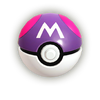 |
Master Ball | Pokémon | A variant of a normal Poké Ball that releases only Legendary Pokémon or Mythical Pokémon, or sometimes Goldeen as a dud. | |
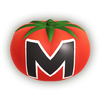 |
Maxim Tomato | Kirby | Also named Maximum Tomato,[1] the item heals 50% of damage, except in the original Super Smash Bros., where it heals 100% of damage. | |
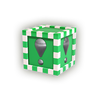 |
Metal Box | Super Mario | Temporarily turns a fighter metal when they pick it up. | |
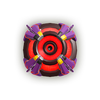 |
Motion-Sensor Bomb | Super Smash Bros. GoldenEye (SSB and Western Melee only) Perfect Dark (Japanese Melee only) |
Also named Motion Mine,[1] is can be set on the ground or another surface until a fighter gets close enough to it, causing it to explode on them. It is an item representing the Super Smash Bros. series in every installment except the original Super Smash Bros. and western versions of Super Smash Bros. Melee, where it is based on GoldenEye 007, and the Japanese version of Melee, where it is based on Perfect Dark (listed "Top Secret" in its corresponding trophy in the English localization); additionally, in the PAL version of Melee, it is known as its original name, the Proximity Mine. In Super Smash Bros. Ultimate, when the Motion-Sensor Bomb is activated, it beeps while the camera zooms in on it before it explodes.
Following a redesign in Super Smash Bros. Brawl, another redesign of the Motion Sensor Bomb was introduced in Super Smash Bros. for Nintendo 3DS / Wii U, giving it the appearance of a small bright-red dome with an eye-like design on top and purple frame. | |
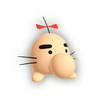 |
Mr. Saturn | EarthBound | Mr. Saturns are items that walk around casually, but can be picked up and thrown at another player to inflict some damage, although it does a lot of shield damage. Peach (and Daisy in Super Smash Bros. Ultimate), when doing her Vegetable move, has 1/166 chance of pulling up a Mr. Saturn instead of a vegetable.
Mr. Saturn also appears in Super Mario Maker as a Mystery Mushroom costume. | |
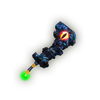 |
Ore Club | Kid Icarus | The item doubles as both a battering item and a shooting item, like the Star Rod. Its slow strikes deal high damage, and its smash attack produces a tornado up to six times to travel across the stage to damage opponents and juggle items. The size and traveling distance of the tornado increases the longer it is charged, with an uncharged tornado being larger than the largest base size of any character. | |
 |
Parasol | Kirby | Players can use it to attack, dealing moderate damage, and to slow the fighter's descent while falling. To stop floating while in mid-flight, the player has to tilt down on the control stick. If Peach uses the Peach Parasol move while holding this item, she will use it in place of her usual Parasol. | |
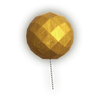 |
Party Ball | Super Smash Bros. | The Party Ball is a container that ascends then stops in place before releasing several items. | |
 |
Pellet | Pikmin | Pellets grow on Pellet Posies in Distant Planet, in red, blue, and yellow cosmetic varieties. A Pellet is dropped from a Pellet Posy upon being attacked. After falling off, a Pellet can be used as a throwing item against opponents or thrown into an Onion for it to release items in its place.
A Pellet appears in WarioWare: Get It Together! as an object needing to be harvested in the microgame Pikmin 2. | |
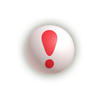 |
Pitfall | Animal Crossing | Pitfalls can be thrown on the ground or a suspended platform to bury and hide it, so if an opponent walks over the Pitfall, they get trapped in a pit temporarily and vulnerable to attack. A Pitfall can be thrown at an opponent in midair to send them straight down. Giga Bowser is unaffected by Pitfalls since he is resistant to flinching, and Wario-Man is unaffected because he is invincible. | |
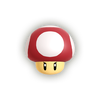 |
Poison Mushroom | Super Mario | Resembles a Super Mushroom, but if a fighter touches it, they shrink temporarily. | |
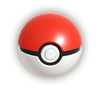 |
Poké Ball | Pokémon | When thrown, the Poké Ball releases a random Pokémon. It is also the Pokémon series symbol and an object that the Pokémon Trainer uses to alternate between Charizard, Squirtle and Ivysaur. | |
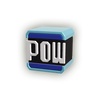 |
POW Block | Super Mario | When thrown, all opponents are launched into the air. A POW Block compresses gradually with each throw and disappears after a few throws. | |
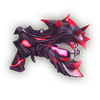 |
Rage Blaster | Super Smash Bros. | An item that fires single shots, much like the Ray Gun, but has a higher damage output the more damaged the user is. | |
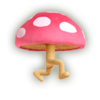 |
Ramblin' Evil Mushroom | EarthBound | When picked up, a Ramblin' Evil Mushroom releases spores that reverse the hit players' controls while giving them a tiny mushroom on their head, a nod to the mushroomized status in EarthBound. | |
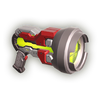 |
Ray Gun | Super Smash Bros. | A Ray Gun can shoot up to sixteen green lasers at opponents, damaging them. In the original Super Smash Bros., the lasers travel quickly, with an audible bang, and deal low damage. In Super Smash Bros. Melee and Super Smash Bros. Brawl, the lasers travel slower, and the loud bang accompanying the shots is replaced by a more laser-like sound.
In original installments, a Ray Gun is depicted as a small, gray gun, and given a futuristic design in Super Smash Bros. Melee and Super Smash Bros. Brawl. Since Super Smash Bros. for Nintendo 3DS / Wii U, it was redesigned to not appear like an actual gun, and features an inverse Super Smash Bros. series symbol inside the barrel.[3] | |
 |
Red Shell | Super Mario | Like the Green Shell, but with homing capabilities. | |
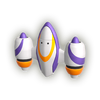 |
Rocket Belt | Pilotwings | The Rocket Belt releases a blue flame, allowing the user to fly continuously for a short time as long as the jump button is held down. If the Rocket Belt is used for too long, the user cannot fly around for a short time, with the Rocket Belt releasing black smokes come from the vent instead. The Rocket Belt flies into the air after being used, possibly hitting and carrying opponents with it. | |
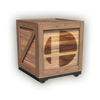 |
Rolling Crate | Super Smash Bros. | A crate that moves on its wheel when hit, running over anyone in the way and damaging them. A Rolling Crate can be stood on. A Rolling Crate can release items if attacked powerfully enough. | |
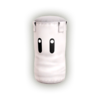 |
Sandbag | Super Smash Bros. | A punching bag functioning mainly as the target in the Home-Run Contest. Since Super Smash Bros. Brawl, Sandbag has become a regular item in matches. In Super Smash Bros. Ultimate, Sandbag is animated, showing a happy expression occasionally, as well as blush after being hit across the field in the Home-Run Contest added in an update on September 5, 2019. | |
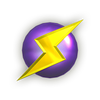 |
Screw Attack | Metroid | If equipped, the user jumps in a manner very similar to Samus's up special move, Screw Attack, jumping with a spin attack that damages opponents on contact. In Super Smash Bros. Melee, a Screw Attack can be thrown at an opponent to inflict minor damage and causes them to perform a spin attack automatically, still damaging them in the process. As of Super Smash Bros. Brawl, the Screw Attack attaches itself to the player, much like the Franklin Badge, allowing the user to use other items with it, but the Screw Attack is no longer throwable. | |
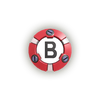 |
Smart Bomb | Star Fox | When a Smart Bomb is thrown or attacked, it explodes, inflicting constant damage to anyone in the growing explosion before finally disappearing and dealing knockback. A Smart Bomb sometimes does not explode immediately and remains on the ground before exploding unexpectedly. As of Super Smash Bros. for Nintendo 3DS / Wii U, a Smart Bomb always explodes when thrown a second time. | |
 |
Smash Ball | Super Smash Bros. | It is a colorful, shining ball bearing the Super Smash Bros. series symbol. It appears randomly to move around the stage, unless there are Dragoon or Daybreak pieces lying around. A Smash Ball requires some hits to break, and the fighter who deals the final hit begins to glow, signaling that their Final Smash can be activated. The Smash Ball can be knocked out of the player and continue roaming the stage if the fighter is attacked enough. If the Smash Ball is not attacked enough on time, it disappears. In Super Smash Bros. Ultimate, the Smash Ball sometimes becomes affected by gravity upon appearing and rolls in the manner of a ball.[4] A few other changes include reappearing a second after falling off the stage, a function reused from Soccer Balls in Super Smash Bros. for Nintendo 3DS / Wii U, as well as an opponent being able to perform a strong enough attack to directly steal the Smash Ball from another character who has the Final Smash on Standby Mode.[5] | |
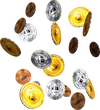 |
Smash Coins | Super Smash Bros. | Appearing mainly in Coin Battles, Smash Coins are released from opponents that are attacked, and fighters lose coins only when KO'd. All sides have the goal to collect the Smash Coins by the end of a Coin Battle and become the winner, unless it ends in a tie, initiating a Sudden Death. The output of an attack can result in bronze, silver, or gold coins, as well as Smash Bills[citation needed] since Super Smash Bros. Brawl, depending on the damage output and knockback of an attack. Gold Smash Coins are worth ten coins (six from Brawl onwards); silver Smash Coins are worth five (three from Brawl onwards); bronze Coins are worth only one; and Bills are worth ten Smash Coins. The player with the most Smash Coins when time runs out wins. | |
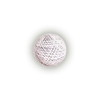 |
Smoke Ball | Super Smash Bros. | An activated Smoke Ball fills the air with colorful smoke, obscuring the view of others, though an activated Smoke Ball can still be picked up and thrown elsewhere. | |
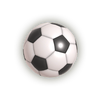 |
Soccer Ball | Super Mario | An object that can be launched at other opponents, dealing knockback. | |
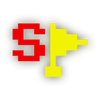 |
Special Flag | Rally-X | The user holds the Special Flag into the air, but cannot move. Any neutral attack activates the holding animation, except a dash neutral, and if the user holds up the Special Flag for three seconds without being hit, they receive an extra KO (in a timed match) or an extra stock (in a stock battle). Special Flags do not appear in coin or stamina battles regardless of item settings, nor do they appear in Smash Tour matches. | |
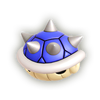 |
Spiny Shell | Super Mario | A Spiny Shell homes in on the player in first before crashing onto them, damaging the player. | |
 |
Spring | Super Mario | A Spring can be bounced off of for a boost in height. | |
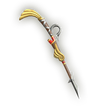 |
Staff | Kid Icarus | The Staff, more specifically the Insight Staff from Kid Icarus: Uprising, fires a beam that deals more damage to a target the farther it was launched from them. | |
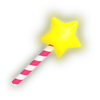 |
Star Rod | Kirby | The Star Rod is similar to the Ray Gun, except it shoots only a limited number of star projectiles; additionally, it can be used as a battering item. | |
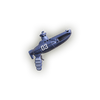 |
Steel Diver | Steel Diver | The Steel Diver launches torpedoes that are barely visible, starting slowly before speeding up and exploding either upon contact with an opponent or an item or after traveling a certain distance. | |
 |
Stock Ball | Super Smash Bros. | Objects with a human-like silhouette in the center surrounded by bright purple and yellow glowing aura. It appears only in Adventure Mode: The Subspace Emissary, giving the player an extra stock during the current stage. | |
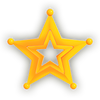 |
Super Launch Star | Super Mario | Any fighter who touches a Super Launch Star is launched a certain distance. | |
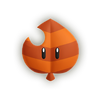 |
Super Leaf | Super Mario | A Super Leaf slows the mid-air descent of any fighter wearing it. | |
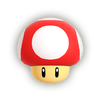 |
Super Mushroom | Super Mario | Grows the user to a larger size temporarily. | |
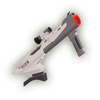 |
Super Scope | Nintendo | Used like the Ray Gun, but can be charged to shoot a larger blast. | |
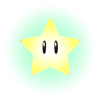 |
Super Star | Super Mario | A Super Star grants the user temporary invinicibility. | |
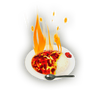 |
Superspicy Curry | Kirby | Eating a Superspicy Curry causes the user to run faster as they breathe out tiny fire balls (in Super Smash Bros. Brawl) or a stream of fire (from Super Smash Bros. for Nintendo 3DS / Wii U onwards) that inflicts flame damage. One of the Special Smash settings enables the Superspicy Curry effects during entire matches. In their idle animation, the fighter affected by Superspicy Curry is seen jumping around and waving at their mouth, and from Super Smash Bros. for Nintendo 3DS / Wii U onwards, also colors their cheeks red. | |
| Target | Super Smash Bros. | Appearing in Target Smash mode, ten of these are scattered throughout a course and must be broken within a time limit to succeed. | ||
 |
Team Healer | Super Smash Bros. | They are functional only in Team Battles when thrown at a teammate, recovering their health, though throwing it at an opponent either damages or heals them. | |
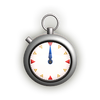 |
Timer | Super Smash Bros. | Picking up a Timer slows the flow of time for all opponents temporarily, or sometimes just the user or all fighters present. Super Smash Bros. Ultimate adds cosmetic effects while a Timer is in effect, including a purple background and a spiraling effect on fighters. | |
 |
Trophy Stand | Super Smash Bros. | Trophy Bases are the base of the trophy, and they appear only in Adventure Mode: The Subspace Emissary. They can be thrown at enemies or bosses if their health is low enough to convert them into a collectible trophy. | |
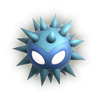 |
Unira | Clu Clu Land | Unira can be picked up and thrown, causing its spikes to pop out, damaging anyone except the user on contact. If an opponent is close enough to a Unira, it draws itself to them. The Unira can change its target, such as if the opponent attacks the Unira thrown by the user, the user becomes the target instead.
Unira also appear in the microgame Clu Clu Land of WarioWare: Twisted! and in another microgame of the same name in WarioWare: Smooth Moves. | |
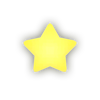 |
Warp Star | Kirby | A Warp Star takes the user up into the air before crashing to the ground almost immediately after, creating an explosion that damages opponents upon impact.
Kirby is also seen riding a Warp Star with Peach in a cutscene of The Subspace Emissary, as well as in Adventure Mode: World of Light to escape light beams launched by Galeem during the opening scene. | |
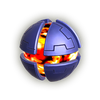 |
X-Bomb | Kid Icarus | The X-Bomb is an item that explodes in two lines of flames that span across the stage in either an X-shaped or cross-shaped formation, damaging opponents on impact only. |
Poké Ball Pokémon[edit]
| Image | Character | 64 | Melee | Brawl | 3DS/ Wii U |
Ultimate | Description |
|---|---|---|---|---|---|---|---|
| Abomasnow | Abomasnow attacks by using Blizzard, releasing a blast of freezing wind around itself that draws opponents towards it and deals minor damage, then charges across the arena with Ice Punch, attacking the nearest opponent with a punch that freezes them in its path and deals severe damage if it hits. | ||||||
| Abra | Abra uses Teleport, warping opponents to a random part of the stage. | ||||||
| Alolan Exeggutor | Alolan Exeggutor acts as a stage barrier, preventing fighters from going through with its long neck, which also doubles as a wall. | ||||||
| Alolan Raichu | Alolan Raichu surfs across the stage, dealing electric damage to opponents it hits. | ||||||
| Alolan Vulpix | Alolan Vulpix attacks using Frost Breath, freezing opponents it hits. | ||||||
| Arceus | Arceus creates a pulse of Gravity, a circular shockwave that smashes opponents downward if they are in the air, though it deals no damage. | ||||||
| Articuno | Articuno releases a continuous wave of ice from its body using Icy Wind, which freezes anyone close to it and deals moderate damage. This also launches them up, occasionally far enough off the screen for a KO. | ||||||
| Beedrill | Beedrill attacks by using Take Down, which involves a single Beedrill flying off the stage, followed by a swarm of Beedrill flying horizontally through the stage and damaging anyone who comes into contact with them. | ||||||
| Bellossom | Bellossom uses Sweet Scent to put any nearby opponents to sleep. | ||||||
| Bewear | Bewear slowly moves across the stage and uses Hammer Arm when it gets close to opponents, uppercutting them and sending them flying. | ||||||
| Blastoise | Blastoise attacks with Hydro Pump, which has it firing blasts of water from the cannons on its shoulders that push away opponents. Despite not appearing as a Poké Ball Pokémon, it appears as a trophy in Super Smash Bros. for Wii U, whereas a Mega Blastoise trophy appears in Super Smash Bros. for Nintendo 3DS. According to a datamine, Blastoise was meant to be playable in the Pokémon Trainer's trio, but it was replaced by Squirtle to balance the size and evolutionary stages of the Pokémon. | ||||||
| Bonsly | Bonsly acts like an item; it can be picked up and carried around like an item - although it is very heavy, and can only be carried around with ease when held by strong characters. When tossed, it does not go far, but it can deal damage exceeding 30%, and knockback comparable to a Home-Run Bat. It can be deflected, or used by players who did not summon it. After being thrown about three times, it disappears, or disappear after being unused for some time. | ||||||
| Celebi | In Super Smash Bros. Melee, Celebi can only appear if every character and stage has been unlocked, every event has been cleared, and the score display has been unlocked. It has a one in 251 chance of appearing, and if it does the player earns an extra 8,000 points at the end of the match. In Super Smash Bros. Brawl, Celebi can appear at any point without needing to unlock it, and when it appears it drops a trophy before flying away; in this game it has a one in 493 chance of appearing. | ||||||
| Chansey | Chansey uses its signature move Soft-Boiled, in which it drops eggs that can either contain items, heal the player, or explode. It also appears in Saffron City, where it can heal the player if they touch it (although its eggs no longer heal), and as one of the floats on the Poké Floats stage. | ||||||
| Charizard | Charizard attacks by turning from side to side while using Flamethrower. In Super Smash Bros. Brawl, Charizard became a playable fighter, both as a part of the Pokémon Trainer and (only in Super Smash Bros. for Nintendo 3DS / Wii U) as an individual. | ||||||
| Chespin | Chespin attacks by using Seed Bomb, releasing explosive seeds from its body. These moderately damage any opponents who are caught in the blast. | ||||||
| Chikorita | Chikorita attacks using Razor Leaf, flinging leaf blades at opponents to damage them. In Super Smash Bros. for Nintendo 3DS / Wii U, Chikorita is replaced by Snivy, which also attacks using Razor Leaf. It also appears as one of the Poké Floats floats. | ||||||
| Clefairy | Clefairy attacks by using Metronome In Super Smash Bros., this move involves copying and using the move of any other Poké Ball Pokémon at random. In Super Smash Bros. Melee, Clefairy uses one of several attacks at random that cause various effects, including: Explosion, which hits any opponents caught in the blast; Blizzard, which freezes any nearby opponents; Fire Spin, which creates a horizontal blast of fire that damages opponents; and Whirlwind, which traps opponents in a whirlwind and damages them. | ||||||
| Cyndaquil | Cyndaquil attacks by using Flamethrower, which involves it jumping up and releasing a small blast of fire from its back; the effect is similar to Charizard, but only in one direction. This deals constant weak damage to any opponent caught in it. Cyndaquil is one of the few Pokémon in Super Smash Bros. Melee that can be knocked off the stage. | ||||||
| Darkrai | Darkrai attacks by using its signature move Dark Void, creating a large dark sphere around itself that puts any opponent that enters it to sleep and deals minor damage to them. | ||||||
| Dedenne | Dedenne attacks by using Discharge, which involves it hovering in the air and releasing electricity that rotates in four beams around it. The electricity hits opponents multiple times, and the final burst does medium knockback. | ||||||
| Deoxys | Deoxys appears in its Attack Forme and attacks by using Hyper Beam, which involves it floating into the air (smashing any opponent it touches as it does so) and firing a giant laser beam, dealing large damage and huge knock to anyone that it comes into contact with. | ||||||
| Ditto | Ditto uses Transform to turn into its summoner and fights alongside them. Ditto copies the character's attributes and moveset, but keeps its purple hue. | ||||||
| Eevee | Eevee uses Take Down to slam itself into nearby opponents, making them take below average damage. Eevee does nothing if no opponents are nearby. | ||||||
| Electrode | Electrode uses Explosion to damage any fighters in its blast radius, including the player that summons it. Electrode can also be picked up and thrown like an item just before it explodes. Starting with Super Smash Bros. Brawl, it may occasionally be a dud, failing to explode after having charged up for a few seconds, but exploding immediately after. In Super Smash Bros., Electrode does not appear as a Poké Ball Pokémon, but instead as a hazard in Saffron City. | ||||||
| Entei | Entei uses Fire Spin (Fire Blast in Super Smash Bros. Melee) to create a large pillar of flame around itself that damages opponents. | ||||||
| Fennekin | Fennekin spits a fireball in front of it that creates a pillar of fire. If the fire hits an opponent, they become stunned and continuously take damage until the fire disappears. | ||||||
| Fletchling | Fletchling attacks by using Peck, which involves it hopping across the stage and pecking any nearby opponents, dealing weak damage and knockback. It can fly back to the stage if it falls off. | ||||||
| Gardevoir | Gardevoir uses Reflect to create a large circular barrier around itself and wanders around the battlefield. Despite being harmless, the shield can deflect projectiles back at the foes, although it does not affect those who summoned Gardevoir. | ||||||
| Genesect | Genesect attacks by using its signature move Techno Blast, which involves it firing four small laser bursts before following it up with a large, continuous beam. The beam is significantly stronger than the bursts, and both attacks can pass through walls. | ||||||
| Giratina | Giratina attacks by using Dragon Breath, blowing a horizontal vortex that shoots across the entire stage, repeatedly dealing weak damage while stuck in the whirlwind. Coming in contact with Giratina deals slightly stronger damage with knockback. | ||||||
| Gogoat | Gogoat attacks using Take Down, represented as charging from one side of the stage to the other and ramming any opponents in its path. Anyone, whether its summoner or other fighters, can jump on top of it and attack from it as it is moving. If it runs into a wall, it becomes momentarily stunned. | ||||||
| Goldeen | Goldeen uses Splash, flailing around in one area with no effect on the battlefield. In the Pokémon franchise, Goldeen is actually unable to learn Splash, which is a move more commonly associated with Magikarp. Goldeen, alongside Zoroark, are the only non-legendary Pokémon that can be summoned from a Master Ball in Super Smash Bros. for Nintendo 3DS / Wii U (although it rarely appears). | ||||||
| Groudon | Groudon attacks by using Overheat; after being summoned, it exerts a glowing aura around it, knocking back opponents and dealing light damage to them. Groudon's size prevents opponents from easily avoiding it, and it can occasionally turn to the other side of the stage. | ||||||
| Gulpin | Gulpin sits stationary where it is released. If an opponent gets close, Gulpin Swallows them, causing damage as long as they are inside. Others can damage whoever is swallowed, but eventually Gulpin spits out the opponent and disappear. | ||||||
| Hitmonlee | Hitmonlee jumps in the air and attacks by using Jump Kick; this involves Hitmonlee extending its leg and leaping towards an opponent, dealing heavy damage and knockback if it connects. This jump has a large arc, which often leads to it simply jumping off the stage. | ||||||
| Ho-Oh | Ho-Oh flies up into the background and attacks with its signature move Sacred Fire, creating a massive burst of fire in the area where it was summoned and dealing massive damage to any opponents caught in it. It can also damage opponents as it flies up. In Super Smash Bros. for Nintendo 3DS / Wii U, Ho-Oh occasionally appears in the background on the Kalos Pokémon League stage when it transitions to the Fire-type room. When the fire pillars are active, Ho-Oh causes them to rise even higher. | ||||||
| Inkay | Inkay attacks by using its signature move Topsy-Turvy, which involves it flipping upside down before slamming into the ground, tripping any opponents in its vicinity. | ||||||
| Jirachi | Jirachi drops stickers for players to grab. It has as a 1 in 493 chance of being spawned from any given Poké Ball, in line with the number of Pokémon that existed at the time of Super Smash Bros. Brawl's release. | ||||||
| Keldeo | Keldeo emerges from the Poké Ball in its Resolute Form and attacks by using its signature move, Secret Sword, by running around the stage and occasionally jumping to slash at opponents with its horn, dealing strong damage with each swipe. | ||||||
| Koffing | Koffing uses Poison Gas, which continuously damages any opponents near it. It also damages any opponents that touch it. While Koffing does not appear in Super Smash Bros. Melee, it is replaced by its evolution Weezing, which uses the same attack with the same effect. | ||||||
| Kyogre | Kyogre attacks by using Hydro Pump, which involves it floating into the air and shooting large bursts of water towards either side of the screen. The water does not do damage (though Kyogre itself has contact damage), but it pushes opponents off of the stage. Opponents can resist the water by shielding or rolling against it. | ||||||
| Kyurem | Kyurem attacks by using Icy Wind, shooting spirals of cold on both sides that freeze any opponents that come into contact with them and deal moderate damage. | ||||||
| Latias and Latios | Latias and Latios are summoned separately, but after one of them flies off-screen, both appear fly diagonally across the screen one at a time to strike opponents with Steel Wing multiple times. | ||||||
| Lugia | Lugia flies up into the background and attacks with its signature move Aeroblast, releasing large whirlwinds onto the stage to damage opponents. It can also damage opponents as it flies up. | ||||||
| Lunala | Lunala enters its Full Moon phase and attacks with its signature move Moongeist Beam, in which it fires a beam from the background. | ||||||
| Manaphy | Manaphy uses Heart Swap, its signature move, which temporarily swaps the body of two players. The players' damage and stocks carry between stocks, and self-destruction causes the dying player to lose a life and not the opponent. Manaphy also occasionally appears as a stage hazard in the Flood Chamber of the Kalos Pokémon League stage in Super Smash Bros. for Wii U, where it uses Whirlpool to create one in the middle of the stage that sucks players down to the bottom of the stage. | ||||||
| Marill | Marill attacks by using Tackle, which involves it running in a single direction, launching back any opponent who gets in its way. Marill continues in the opposite direction if it hits a wall; if it ends up in an enclosed space, it continues to bounce back and forth until it disappears. | ||||||
| Marshadow | Marshadow hides under opponents, stuns them with shadows, and attacks using Spectral Thief to punch them. | ||||||
| Meloetta | Meloetta attacks by using Echoed Voice, shooting a pair of melodic projectiles that bounce from walls and reflect off the stage's perimeter, dealing moderate damage and knockback to any opponents that come into contact with them. In Super Smash Bros. for Nintendo 3DS, it is unlocked by having the game on for at least eight hours, while in Super Smash Bros. for Wii U, it can be unlocked by clearing All-Star mode with Lucario on Normal or Hard difficulty. | ||||||
| Meowth | Meowth attacks by using Pay Day, shooting out coins that damage opponents. In Super Smash Bros., it shoots coins in four directions, whereas in Super Smash Bros. Brawl and Super Smash Bros. for Nintendo 3DS / Wii U, it instead shoots coins to the left or right, turning to the direction of the nearest opponent when necessary. | ||||||
| Metagross | Metagross attacks by using Earthquake, in which it stomps its feet into the ground, causing any fighters near it to be buried and launching them with another stomp. | ||||||
| Mew | When Mew is summoned, it cries out its name and flies up off the screen. It gives the player a score bonus at the end of a match in Super Smash Bros. and Super Smash Bros. Melee, and has a one in 251 chance of appearing. In Super Smash Bros. Brawl, it drops a CD (or a Sticker if the player has every CD) and has a one in 493 chance of appearing. Finally, it drops a custom part or a trophy in Super Smash Bros. for Nintendo 3DS / Wii U, though it can also drop a CD in the Wii U version. | ||||||
| Mimikyu | Mimikyu uses its signature Z-Move Let's Snuggle Forever, grabbing opponents and trapping them inside its disguise. The captured opponents repeatedly take damage, and if they are at 100% damage or higher, they will be instantly KO'd. | ||||||
| Moltres | Moltres sits in place before flying away, damaging any players on contact. In Super Smash Bros., Moltres makes a cameo appearance flying in the background on the Saffron City stage. | ||||||
| Munchlax | Munchlax wanders around the stage, eating any items it comes across and removing them from play. Munchlax cannot eat Trophies, CDs, Stickers, Poké Balls or Smash Balls. | ||||||
| Onix | Onix jumps to the top of the stage and uses Rock Throw to drop many boulders in one area. Onix can damage opponents itself while dropping rocks, and the rocks launch away opponents if they hit. If opponents touch Onix before it rises upward, they also take damage. | ||||||
| Oshawott | Oshawott attacks by using Surf, riding a wave towards the stage's edge and beyond, dragging any opponents caught in the path with it. | ||||||
| Palkia | Palkia uses its signature move, Spacial Rend, which involves it slashing across the screen and flipping the camera. This affects nothing other than the player's viewpoint. Coming into contact with it does minor damage. Eventually, the screen tilts back to normal and Palkia disappears. Palkia also appears as a stage hazard within Spear Pillar in Super Smash Bros. Brawl. | ||||||
| Piplup | Piplup attacks by using Surf; when summoned, it slides across the ground on a wave of water, pushing any opponent that gets caught along with it. It moves in the other direction if it hits a wall, and does not stop moving even if it falls off the stage. In later games, Oshawott occupies the same role with the same behavior. | ||||||
| Porygon2 | Porygon2 attacks by using Tackle; as soon as it is spawned, it dashes a short distance horizontally before disappearing, dealing moderate damage and a huge amount of knockback, in the opposite direction of Porygon2's tackle, to any opponents caught by it. | ||||||
| Pyukumuku | Pyukumuku uses Counter on an opponent who touches it. It can also be picked up and thrown like an item. | ||||||
| Raikou | Raikou attacks with Spark, releasing electricity around itself that shocks and deals multiple hits to opponents who are on the ground. | ||||||
| Scizor | Scizor attacks by using Metal Claw, which involves it running forward for a short while before jumping up and falling off the stage, dealing heavy damage to opponents and launching them towards the top of the stage. In Super Smash Bros. for Wii U, Scizor makes a background appearance on the Kalos Pokémon League stage, appearing alongside various other Steel-type Pokémon in the Steel-type room. | ||||||
| Snivy | Snivy attacks by using Razor Leaf, firing a stream of sharp leaves towards one side of the screen, dealing moderate damage to any opponent that it hits. In reality, Snivy cannot learn this move. | ||||||
| Snorlax | Snorlax leaps up into the air and attacks with Body Slam, falling down onto the battlefield at a larger size and smashing any opponents in its path, sending them flying. It can also attack opponents when flying up after being summoned. Snorlax also appears as one of the balloons in the Poké Floats stage in Super Smash Bros. Melee. | ||||||
| Solgaleo | Solgaleo enters its Radiant Sun phase and attacks with its signature move Sunsteel Strike, in which it charges at opponents while encased in flames. | ||||||
| Spewpa | Spewpa, if left undisturbed, sits unmoving for the entire duration of its summon. If attacked, however, it releases a Stun Spore cloud which causes any opponent which comes into contact with the spores to become momentarily paralyzed. | ||||||
| Starmie | Starmie positions itself to the nearest foe and uses Swift; after being spawned, it hovers towards an opponent and shoots a barrage of stars at them, dealing minor damage but trapping them in the blast. Damage can also be taken by coming into contact with Starmie itself. Unlike Staryu in the later games, it lines up its attack on the opponent's position the moment it is released and will not follow opponents. | ||||||
| Staryu | Staryu attacks by using Swift, which involves it floating towards an opponent and firing a series of stars, dealing minor damage while locking them in the shots. Staryu itself deals direct contact damage as well. | ||||||
| Suicune | In Super Smash Bros. Melee, Suicune uses Blizzard, creating an icy whirlwind around itself that freezes any nearby opponents. In later games, Suicune attacks with Aurora Beam; Suicune fires a horizontal laser across the screen that heavily damages any opponents in its path. | ||||||
| Swirlix | Swirlix attacks by using Cotton Spore, releasing a continuous bunch of spores that heavily slow any opponents caught in the cloud. Swirlix is otherwise motionless. | ||||||
| Tapu Koko | Tapu Koko surrounds itself with an electric field that stuns opponents, as well as shooting out electricity. | ||||||
| Togedemaru | Togedemaru uses Zing Zap, surrounding itself with electricity after a bolt zaps it. | ||||||
| Togepi | Togepi attacks with Metronome, in which it uses a random attack that causes one of several various effects to occur, including Magnitude, which causes an earthquake which traps opponents in the ground; Night Shade, which covers the stage in darkness; Hypnosis, which puts opponents to sleep; Leech Seed, which causes a flower to sprout on opponents' heads, similar to Lip's Stick; and Ice Beam, which freezes opponents on contact. | ||||||
| Torchic | Torchic attacks by using Fire Spin, which involves it engulfing itself in flames, trapping opponents in the fire while accumulating damage. At the end of the attack, the trapped opponents get launched back a far distance. | ||||||
| Unown | Unown attacks by using Take Down; a single Unown is spawned and flies off-screen, dealing moderate knockback and damage if it hits an opponent. After it flies away, a swarm of Unown soon flies diagonally across the screen, juggling opponents who come into contact with them. The original Unown that was released cannot be blocked, but the Unown swarm can be blocked. | ||||||
| Venusaur | Venusaur attacks by using Earthquake, which involves Venusaur stomping on the ground, creating shockwaves that do strong damage and knockback to any opponent caught in it. | ||||||
| Victini | Victini does not directly attack when summoned, instead it temporarily makes the summoner immune to knockback and gives them a boost to their attacks. In Super Smash Bros. for Nintendo 3DS, it is unlocked by playing 100-Man Smash for the first time, and in Super Smash Bros. for Wii U, it is unlocked by clearing All-Star Mode for the first time. In Super Smash Bros. Ultimate, it instead gives the summoner a Final Smash. | ||||||
| Vulpix | Vulpix attacks using Ember, burning opponents it hits. | ||||||
| Weavile | Weavile performs False Swipe. It attacks foes by dashing back and forth in one defined area. Foes hit by this attack are stunned, as if their Shield has been broken. However, if the player is hit while in the air by Weavile (even though it stays on the ground), the player goes flying straight up. | ||||||
| Weezing | Weezing attacks by using Smog, which involves it continuously emitting gas out of its body, dealing low damage and knockback to any opponents that comes into contact with it. If they end up at Weezing's center, they become stuck and steadily take damage. | ||||||
| Wobbuffet | Wobbuffet uses Counter during the battle, though it does not attack directly; it instead recoils due to being attacked. The stronger the attack, the faster Wobbuffet wobbles, and while it wobbles, both the summoner and their opponents takes reciprocal damage. | ||||||
| Xerneas | Xerneas uses its signature move, Geomancy, which involves it stepping on the ground and causing all players to glow. During this state, all of their attacks have increased knockback, though the summoner gets a bigger benefit from the move. In Super Smash Bros. for Nintendo 3DS it is unlocked after playing Target Blast for the first time, and in Super Smash Bros. for Wii U it is unlocked by destroying 200 blocks in one single player Trophy Rush game as Pikachu. In Super Smash Bros. Ultimate, it instead turns the summoner gold, increasing their attack power and making them immmune to flinches. | ||||||
| Zapdos | Zapdos attacks by using Thunder Shock, which involves Zapdos discharging sparks around it, dealing weak damage and knockback to opponents that end up near it. It is possible for them to get stuck in the sparks, racking up damage. In Super Smash Bros. for Nintendo 3DS, Zapdos occasionally appears in the background of the Prism Tower stage. | ||||||
| Zoroark | Zoroark attacks by using Fury Swipes, grabbing a single opponent and launching them in the air, then swiping at them multiple times for moderate damage before smashing them back to the ground. However, the move fails if the targeted opponent is being grabbed by another fighter; instead Zoroark keeps slashing at the grabbed opponent until it disappears. Zoroark is one of only two non-Legendary or Mythical Pokémon who can be released from a Master Ball, the other being Goldeen. |
Gallery[edit]
Names in other languages[edit]
This section is a stub. Please consider expanding it to include any missing information. Specifics: Transclude names in other languages from items with their own articles (e.g. Poison Mushroom)
- Back Shield
| Language | Name | Meaning | Notes |
|---|---|---|---|
| Japanese | バックシールド[6] Bakku Shīrudo |
Back Shield | Super Smash Bros. Ultimate |
| French | Bouclier Dorsale[11] | Back Shield | Super Smash Bros. Ultimate |
| German | Rückenschild[8] | Back Shield | Super Smash Bros. Ultimate |
| Russian | Спинощит[7] Spinoshchit |
Back Shield | Super Smash Bros. Ultimate |
| Spanish | Retroescudo[9][10] | Retro Shield | Super Smash Bros. Ultimate |
- Banana Gun
| Language | Name | Meaning | Notes |
|---|---|---|---|
| Japanese | バナナガン[12] Banana Gan |
Banana Gun | |
| Chinese (Simplified) | 香蕉枪[16] Xiāngjiāo qiāng |
Banana Gun | |
| Chinese (Traditional) | 香蕉槍[15] Xiāngjiāo qiāng |
Banana Gun | |
| French | Pistobanane[13] | Bananagun | |
| German | Bananenkanone[17] | Banana Canon | |
| Italian | Pistola Banana[18] | Banana Gun | |
| Russian | Бананаган[14] Bananagan |
Bananagun | |
| Spanish | Pistola plátano[19] | Banana gun |
- Beam Sword
| Language | Name | Meaning | Notes |
|---|---|---|---|
| Japanese | ビームソード[?] Bīmu Sōdo |
Beam Sword | |
| Chinese | 光束劍 (Traditional) 光束剑 (Simplified)[?] Guāngshù jiàn |
Beam Sword | |
| French | Sabre laser[?] | Laser sword; same as Lightsaber | |
| German | Laserschwert[?] | Laser Sword | |
| Italian | Spada laser[?] | Laser sword; same as Lightsaber | |
| Portuguese | Espada de Feixe de Luz[?] | Light Beam Sword | |
| Russian | Лучевой меч[?] Luchevoy mech |
Beam Sword | |
| Spanish | Espada láser[?] | Laser sword |
- Beastball
| Language | Name | Meaning | Notes |
|---|---|---|---|
| Japanese | Makyū |
Magicball (Literally "demonball") | |
| French | Balle Démoniaque[?] | Devil Ball | |
| Spanish | Bola mágica[?] | Magic ball |
- Beetle
| Language | Name | Meaning | Notes |
|---|---|---|---|
| Japanese | ビートル[?] Bītoru |
Beetle | |
| Chinese (Simplified) | 甲壳虫[?] Jiǎkéchóng |
Beetle | |
| Chinese (Traditional) | 甲蟲[?] Jiǎchóng |
Beetle | |
| French | Scarabée[?] | Beetle | |
| German | Käfer[?] | Beetle | |
| Russian | Жук[?] Zhuk |
Beetle | |
| Spanish (Latin American) | Escarabajo[?] | Beetle | |
| Spanish (European) | Telescarabajo[?] | Telebeetle |
- Black Hole
| Language | Name | Meaning | Notes |
|---|---|---|---|
| Japanese | ブラックボール[?] Burakku Bōru |
Black Ball | |
| Chinese | 黑洞[?] Hēidòng |
Black Hole | |
| French | Trou Noir[?] | Black Hole | |
| German | Schwarzes Loch[?] | Black Hole | |
| Italian | Buco nero[?] | Black Hole | |
| Russian | Черная дыра[?] Chyornaya dyra |
Black Hole | |
| Spanish | Agujero negro[?] | Black hole |
- Blast Box
| Language | Name | Meaning | Notes |
|---|---|---|---|
| Japanese | Bakuyaku-bako |
Explosive Box | |
| Chinese | 炸藥箱 (Traditional) 炸药箱 (Simplified)[?] Zhàyào xiāng |
Explosive box | |
| Dutch | Explosieve kist[?] | Explosive Box | |
| French | Caisse explosive[?] | Explosive box | |
| German | Kawummkiste[?] | Kaboom Box | |
| Italian | Cassa esplosiva[?] | Explosive box | |
| Korean | 화약 상자[?] Hwayak Sangja |
Gun powder box | |
| Russian | Бум-ящик[?] Bum-yashchik |
Boom-box | |
| Spanish | Caja explosiva[?] | Explosive box |
- Bombchu
| Language | Name | Meaning | Notes |
|---|---|---|---|
| Japanese | ボムチュウ[?] Bomuchū |
Portmanteau of "bomb" and「ちゅう」(chū, onomatopoeia for mouse's squeaking) | |
| Chinese | 炸彈鼠 (Traditional) 炸弹鼠 (Simplified)[?] Zhàdàn shǔ |
Bomb Mouse | |
| French | Missile Teigneux[?] | Snarky Missile | |
| German | Krabbelmine[?] | Scuttle Mine | |
| Russian | Бомбышь[?] Bombysh' |
From "бомба" (bomba, "bomb") and "мышь" (mysh', "mouse") | |
| Spanish (Latin American) | Bombchu[?] | - | |
| Spanish (European) | Bombuchu[?] | Bombchu |
- Bomber
| Language | Name | Meaning | Notes |
|---|---|---|---|
| Japanese | ボンバー[?] Bonbā |
Bomber | |
| Chinese (Simplified) | 漫步大炸弹[?] Mànbù dà zhàdàn |
Wandering Big Bomb | |
| Chinese (Traditional) | 漫步大炸彈[?] Mànbù dà zhàdàn |
Wandering Big Bomb | |
| French | Bombinet[?] | Portmanteau of bombe ("bomb") and binet ("pussy cat") | |
| German | Bombio[?] | - | |
| Italian | Bomber[?] | - | |
| Russian | Бомбик[?] Bombik |
Masculine diminutive form of "бомба" (bomba, bomb) | |
| Spanish | Bomber[?] | - |
- Bunny Hood
| Language | Name | Meaning | Notes |
|---|---|---|---|
| Japanese | ウサギずきん[?] Usagi Zukin |
Bunny Hood | |
| Chinese | 兔子頭箍 (Traditional) 兔子头箍 (Simplified)[?] Tùzi tóu gū |
Bunny Headband | |
| French | Masque de Lapin[?] | Rabbit Mask | |
| German | Hasenohren[?] | Rabbit Ears | |
| Russian | Заячьи уши[?] Zayach'i ushi |
Bunny ears | |
| Spanish | Capucha de conejo[?] | Bunny hood |
- Capsule
| Language | Name | Meaning | Notes |
|---|---|---|---|
| Japanese | カプセル[?] Kapuseru |
Capsule | |
| Chinese | 膠囊 (Traditional) 胶囊 (Simplified)[?] Jiāonáng |
Capsule | |
| French | Capsule[?] | - | |
| German | Kapsel[?] | Capsule | |
| Italian | Capsula[?] | Capsule | |
| Russian | Капсула[?] Kapsula |
Capsule | |
| Spanish | Cápsula[?] | Capsule |
- Cloaking Device
| Language | Name | Meaning | Notes |
|---|---|---|---|
| Japanese | スパイクローク[?] Supai Kurōku |
Spy Cloak | |
| French | Occulteur d'invisibilité[?] | Invisibility Occultor | |
| Italian | Dispositivo di mimesi[?] | Mimetic device | |
| Spanish | Dispositivo de Ocultación[?] | Concealment Device |
- Cracker Launcher
| Language | Name | Meaning | Notes |
|---|---|---|---|
| Japanese | クラッカーランチャー[?] Kurakkā Ranchā |
Cracker Launcher | |
| French | Lance-Pétards[?] | Firecracker Launcher | |
| German | Feuerwerkskanone[?] | Fireworks Cannon | |
| Italian | Lanciapetardi[?] | Firecracker Launcher | |
| Korean | 크래커 화염포[?] Keuraekeo Hwayeompo |
Cracker Flame Cannon | |
| Spanish | Lanzapetardos[?] | Firecracker Launcher |
- Cucco
| Language | Name | Meaning | Notes |
|---|---|---|---|
| Japanese | コッコ[?] Kokko |
From「コケコッコー」(kokekokkō, an onomatopoeia for the peeps of a newborn chick and a childish term for a diminutive breed of chicken) | |
| Chinese | 咕咕雞 (Traditional) 咕咕鸡 (Simplified)[?] Gūgū jī |
Cucco | |
| French | Cocotte[?] | Onomatopoeia for clucking and a childish term for chicken | |
| German | Huhn[?] | Chicken | |
| Italian | Coccò[?] | Similar to "coccodé" (onomatopoeia for clucking) | |
| Russian | Кокко[?] Kokko |
Cucco | |
| Spanish | Cuco[?] | Cuckoo |
- Daybreak
| Language | Name | Meaning | Notes |
|---|---|---|---|
| Japanese | ジェネシスパーツ[?] Jeneshisu Pātsu |
Genesis Parts | |
| French | Morceaux de la Genèse[?] | Genesis parts | |
| German | Morgenröte-Teile[?] | Dawn parts | |
| Russian | Рассвет[?] Rassvet |
Daybreak | |
| Spanish | Partes de la Aurora[?] | Dawn Parts |
- Death's Scythe
| Language | Name | Meaning | Notes |
|---|---|---|---|
| Japanese | Shinigami no Kama |
Grim Reaper's Scythe | |
| French | Faux de la Mort[?] | Scythe of Death | |
| German | Todessense[?] | Death Scythe | |
| Italian | Falce della Morte[?] | Scythe of Death | |
| Russian | Коса Смерти[?] Kosa Smerti |
Death's Scythe | |
| Spanish (Latin American) | Hoz de la Muerte[?] | Death Sickle | |
| Spanish (European) | Guadaña de la Muerte[?] | Death Scythe |
- Deku Nut
| Language | Name | Meaning | Notes |
|---|---|---|---|
| Japanese | デクの Deku no Mi |
Deku Nut | |
| Chinese | 德庫堅果 (Traditional) 德库坚果 (Simplified)[?] Dékù jiānguǒ |
Deku Nut | |
| Dutch | Dekunoot[?] | Deku Nut | |
| French | Noix Mojo[?] | Mojo Nut | |
| German | Deku-Nuss Deku-Nuß[?] |
Deku-Nut | |
| Italian | Noce Deku[?] | Deku Nut | |
| Korean | 데크의 열매[?] Dekeu-ui Yeolmae |
Deku's Nut | |
| Russian | Орех Дэку[?] Orekh Deku |
Deku Nut | |
| Spanish | Nuez deku[?] | Deku nut |
- Dragoon
| Language | Name | Meaning | Notes |
|---|---|---|---|
| Japanese | ドラグーンパーツ[?] Doragūn Pātsu |
Dragoon Parts | |
| French | Morceaux de Dragoon[?] | Dragoon parts | |
| German | Dragoon-Teile[?] | Dragoon Parts | |
| Russian | Части Драгуна[?] Chasti Draguna |
Dragoon Parts | |
| Spanish | Partes del Dragoon[?] | Dragoon Parts |
- Drill
| Language | Name | Meaning | Notes |
|---|---|---|---|
| Japanese | ドリル[?] Doriru |
Drill | |
| Chinese | 鑽頭 (Traditional) 钻头 (Simplified)[?] Zuàntóu |
Drill | |
| French | Forreuse[?] | Drill | |
| German | Bohrer[?] | Drill | |
| Russian | Бур[?] Bur |
Drill | |
| Spanish | Taladro[?] | Drill |
- Fairy Bottle
| Language | Name | Meaning | Notes |
|---|---|---|---|
| Japanese | Yōsei no Bin |
Fairy Bottle | |
| Chinese (Simplified) | 精灵之瓶[?] Jīnglíng zhī píng |
Fairy Bottle | |
| Chinese (Traditional) | 妖精之瓶[?] Yāojing zhī píng |
Fairy Bottle | |
| French | Fée en Bouteille[?] | Fairy in Bottle | |
| German | Feenflasche[?] | Fairy Bottle | |
| Russian | Бутылка феи[?] Butylka fei |
Fairy's bottle | |
| Spanish (Latin American) | Hada en botella[?] | Fairy in bottle | |
| Spanish (European) | Hada embotellada[?] | Fairy in a bottle |
- Fake Smash Ball
| Language | Name | Meaning | Notes |
|---|---|---|---|
| Japanese | スマッシュボーム[20] Sumasshu Bōmu |
Pun on "Smash Ball" and "bomb" | |
| Chinese | 亂鬥彈 (Traditional) 乱斗弹 (Simplified)[?] Luàn dòu dàn |
Smash Bomb | |
| French | Fausse Balle Smash[?] | Fake Smash Ball | |
| German | Smash-Bombe[?] | Smash Bomb | |
| Italian | Bomba Smash finta[?] | Fake Smash Bomb | |
| Russian | Смеш-бомба[?] Smesh-bomba |
Smash Bomb | |
| Spanish | Bola Smash falsa[?] | Fake Smash ball |
- Fan
| Language | Name | Meaning | Notes |
|---|---|---|---|
| Japanese | はりせん[?] Harisen |
Harisen | |
| French | Éventail[?] | Fan | |
| German | Fächer[?] | Fan | |
| Italian | Ventaglio[?] | Fan | |
| Spanish | Abanico[?] | Fan |
- Flipper
| Language | Name | Meaning | Notes |
|---|---|---|---|
| Japanese | グルグル[?] Guruguru |
Japanese onomatopoeia for spinning; shared with Spinner | |
| Spanish | Flipper[?] | - |
- Food
| Language | Name | Meaning | Notes |
|---|---|---|---|
| Japanese | たべもの[?] Tabemono |
Food | |
| Chinese | 食物[?] Shíwù |
Food | |
| French | Nourriture[?] | Food | |
| German | Nahrungsmittel[?] | Food | |
| Spanish | Comida[?] | Food |
- Franklin Badge
| Language | Name | Meaning | Notes |
|---|---|---|---|
| Japanese | フランクリンバッヂ[?] Furankurin Bajji |
Franklin Badge | |
| フランクリンバッジ[?] Furankurin Bajji |
Mother 2 | ||
| Dutch | Franklin-badge[?] | Franklin Badge | |
| French (Canadian) | Badge Franklin[?] | Franklin Badge | |
| French (European) | Badge Franklin[?] | Franklin Badge | |
| German | Franklin Badge[?] | Franklin Badge | |
| Italian | Medaglia Franklin[?] | Franklin Badge | |
| Portuguese | Emblema Franklin[?] | Franklin Badge / Franklin Emblem | |
| Russian | Значок Франклина[?] Znachok Franklina |
Franklin's Badge | |
| Spanish (Latin American) | Insignia Franklin[?] | Franklin Badge | |
| Spanish (European) | Broche Franklin[?] | Franklin Brooch |
- Gooey Bomb
| Language | Name | Meaning | Notes |
|---|---|---|---|
| Japanese | チューインボム[?] Chūin Bomu |
Chewing Bomb Pun on "chewing gum" and "bomb" |
|
| Chinese | 泡泡糖炸彈 (Traditional) 泡泡糖炸弹 (Simplified)[?] Pàopaotáng zhàdàn |
Bubble Gum Bomb | |
| French | Bombe Gluante[?] | Sticky Bomb | |
| German | Klebebombe[?] | Sticky Bomb | |
| Russian | Бомба-липучка[?] Bomba-lipuchka |
Sticky Bomb | |
| Spanish | Bomba Gooey[?] | Gooey Bomb |
- Gust Bellows
| Language | Name | Meaning | Notes |
|---|---|---|---|
| Japanese | まほうのツボ[?] Mahō no Tsubo |
Magic Pot | |
| Chinese | 魔法壺 (Traditional) 魔法壶 (Simplified)[?] Mófǎ hú |
Magic Pot | |
| French | Jarre Magique[?] | Magic Jar | |
| German | Magischer Krug[?] | Magic Jug | |
| Russian | Ветродув[?] Vetroduv |
Windblower | |
| Spanish | Ánfora de aire[?] | Air amphora |
- Healing Field
| Language | Name | Meaning | Notes |
|---|---|---|---|
| Japanese | Kaifuku Fīrudo |
Heal Field | |
| French | Champ de Soin[?] | Healing Field | |
| Spanish | Campo curativo[?] | Healing field |
- Healing Sprout
| Language | Name | Meaning | Notes |
|---|---|---|---|
| Japanese | やすらぎのたま[?] Yasuragi no Tama |
Ball of Serenity | |
| Chinese | 康復球 (Traditional) 康复球 (Simplified)[?] Kāngfù qiú |
Recovery Ball | |
| French | Pousse apaisante[21] | Soothing sprout | |
| German | Linderungssphäre[?] | Alleviation Sphere | |
| Italian | Sfera della salute[?] | Sphere of health | |
| Russian | Лекарственный росток[?] Lekarstvennyy rostok |
Healing Sprout | |
| Spanish | Brote curativo[?] | Healing sprout |
- Heart Container
| Language | Name | Meaning | Notes |
|---|---|---|---|
| Japanese | ハートのうつわ[?] Hāto no Utsuwa |
Heart Container | |
| Chinese | 心之容器[?] Xīn zhī róngqì |
Heart Container | |
| French | Réceptacle de Cœur[?] | Heart Receptacle | |
| German | Herzcontainer[?] | Heart Container | |
| Italian | Portacuori[?] | Heart container | |
| Russian | Капсула сердца[?] Kapsula serdtsa |
Heart Capsule | |
| Spanish | Contenedor de corazón[?] | Heart container |
- Hocotate Bomb
| Language | Name | Meaning | Notes |
|---|---|---|---|
| Japanese | ドルフィン Dorufin Bakudan |
Dolphin Bomb | |
| Chinese | 多露芬炸彈 (Traditional) 多露芬炸弹 (Simplified)[?] Duōlùfēn zhàdàn |
Dolphin Bomb | |
| French | Bombe Hocotate[?] | Hocotate Bomb | |
| German | Hocotate-Bombe[?] | Hocotate Bomb | |
| Italian | Bomba Hoctate[?] | Hoctate Bomb | |
| Russian | Бомба «Хокотатэ»[?] Bomba «Khokotate» |
Hocotate Bomb | |
| Spanish | Bomba Hocotate[?] | Hocotate Bomb |
- Home-Run Bat
| Language | Name | Meaning | Notes |
|---|---|---|---|
| Japanese | ホームランバット[?] Hōmu Ran Batto |
Home Run Bat | |
| Chinese (Simplified) | 全垒打球棒[?] Quán lěi dǎ qiú bàng |
Home Run Bat | |
| Chinese (Traditional) | 全壘打球棒[?] Quán lěi dǎ qiú bàng |
Home Run Bat | |
| French | Batte de baseball[?] | Baseball Bat | |
| German | Baseballschläger[?] | Baseball Bat | |
| Italian | Mazza da fuoricampo[?] | Homerun bat | |
| Russian | Бейсбольная бита[?] Beysbol'naya bita |
Baseball Bat | |
| Spanish | Bate de béisbol[?] | Baseball bat |
- Killer Eye
| Language | Name | Meaning | Notes |
|---|---|---|---|
| Japanese | キラーアイ[?] Kirā Ai |
Killer Eye | |
| French | Œil-qui-tue[?] | Eye-that-kills | |
| German | Killerauge[?] | Killer Eye | |
| Russian | Бедоглаз[?] Bedoglaz |
From "беда" (beda, disaster) and "глаз" (glaz, eye) | |
| Spanish | Ojo asesino[?] | Killer eye |
- Killing Edge
| Language | Name | Meaning | Notes |
|---|---|---|---|
| Japanese | キルソード[?] Kiru Sōdo |
Kill Sword | |
| Chinese | 必殺劍 (Traditional) 必杀剑 (Simplified)[?] Bìshā jiàn |
Sure-Killing Sword | |
| French | Fer létal[22] | Lethal Blade | |
| German | Schnitter[?] | Reaper | |
| Italian | Lama Letale[?] | Lethal Blade | |
| Russian | Клинок погибели[?] Klinok pogibeli |
Blade of Death | |
| Spanish | Espada asesina[?] | Killer sword |
- Lip's Stick
| Language | Name | Meaning | Notes |
|---|---|---|---|
| Japanese | リップステッキ[?] Rippu Sutekki |
Lip Stick | |
| French | Scèptre de Lip[?] | Lip's scepter | |
| German | Lip's Stick[?] | Lip's Stick | |
| Russian | Дубинка Лип[?] Dubinka Lip |
Lip's Club | |
| Spanish | Varita de Lip[?] | Lip's wand |
- Master Ball
| Language | Name | Meaning | Notes |
|---|---|---|---|
| Japanese | マスターボール[?] Masutā Bōru |
Master Ball | |
| Chinese | 大師球 (Traditional) 大师球 (Simplified)[?] Dàshī qiú |
Master Ball | |
| German | Meisterball[?] | Master Ball | |
| Russian | Мастер-Болл[?] Master-Boll |
Master Ball | |
| Spanish | Master Ball[?] | - |
- Maxim Tomato
| Language | Name | Meaning | Notes |
|---|---|---|---|
| Japanese | マキシムトマト[?] Makishimu Tomato |
Maxim Tomato | |
| Chinese | M番茄[?] M fānqié |
M Tomato | |
| French | Maxi Tomate[?] | Maxi Tomato | |
| German | Maxi-Tomate[?] | Maxi Tomato | |
| Italian | Pomodoro Maxim[?] | Maxim Tomato | |
| Korean | 맥시멈 토마토[?] Maeksimeom Tomato |
Maximum Tomato | |
| Russian | Макси-томат[?] Maksi-tomat |
Maxi Tomato | |
| Spanish | Maxi Tomate[?] | Maxi Tomato |
- Motion-Sensor Bomb
| Language | Name | Meaning | Notes |
|---|---|---|---|
| Japanese | センサー Sensā Bakudan |
Sensor Bomb | |
| Chinese | 感應炸彈 (Traditional) 感应炸弹 (Simplified)[?] Gǎnyìng zhàdàn |
Sensor Bomb | |
| Dutch | Sensorbom[?] | Sensor Bomb | |
| French | Bombe à détection[?] | Detection Bomb | |
| German | Sensorikbombe[?] | Sensor Bomb | |
| Italian | Bomba di prossimità[?] | Proximity Bomb | |
| Korean | 모션 센서 폭탄[?] Mosyeon Senseo Poktan |
Motion-Sensor Bomb | |
| Russian | Сенсорная бомба[?] Sensornaya bomba |
Sensor Bomb | |
| Spanish | Mina de proximidad[?] | Proximity mine |
- Mr. Saturn
| Language | Name | Meaning | Notes |
|---|---|---|---|
| Japanese | どせいさん[?] Dosei san |
Mr. Saturn | |
| German | Mr. Saturn[?] | Mr. Saturn | |
| Korean | 토성씨[?] Toseong-ssi |
Mr. Saturn | |
| Russian | Господин Сатурн[?] Gospodin Saturn |
Mister Saturn | |
| Spanish | Mr. Saturn[?] | - |
- Orange cube
| Language | Name | Meaning | Notes |
|---|---|---|---|
| Japanese | オレンジボックス[23] Orenji bokkusu |
Orange box | |
| French | Cube-orange[24] | Orange-cube | |
| German | Orange würfel[25] | Orange cube | |
| Italian | Cubo arancione[26] | Orange cube | |
| Spanish | Cubo naranja[27] | Orange cube |
- Ore Club
| Language | Name | Meaning | Notes |
|---|---|---|---|
| Japanese | Kyotō |
Japanese name for clubs in general in Kid Icarus: Uprising Literally "giant tower" |
|
| French | Massue Minerai[?] | Ore Club | |
| German | Erzkeule[?] | Ore Mace | |
| Russian | Каменная палица[?] Kamennaya palitsa |
Stone Club | |
| Spanish | Maza de hierro[?] | Iron club |
- Parasol
| Language | Name | Meaning | Notes |
|---|---|---|---|
| Japanese | パラソル[?] Parasoru |
Parasol | |
| Spanish | Sombrilla[?] | Parasol |
- Pellet
| Language | Name | Meaning | Notes |
|---|---|---|---|
| Japanese | ペレット[?] Peretto |
Pellet | |
| French | Pallet[?] | Pellet | |
| Spanish | Píldora[?] | Pellet |
- Pitfall
| Language | Name | Meaning | Notes |
|---|---|---|---|
| Japanese | おとしあなのタネ[?] Otoshiana no Tane |
Pitfall Seed | |
| Chinese | 陷阱種子 (Traditional) 陷阱种子 (Simplified)[?] Xiànjǐng zhǒngzi |
Pitfall Seed | |
| French | Piège[?] | Trap | |
| German | Falle[?] | Pitfall | |
| Italian | Trappola[?] | Trap | |
| Russian | Западня[?] Zapadnya |
Pitfall | |
| Spanish | Trampa[?] | Trap |
- Poké Ball
| Language | Name | Meaning | Notes |
|---|---|---|---|
| Japanese | モンスターボール[?] Monsutā Bōru |
Monster Ball | |
| Chinese | 精靈球 (Traditional) 精灵球 (Simplified)[?] Jīnglíng qiú |
Poké Ball | |
| German | Pokéball[?] | Poké Ball | |
| Russian | Поке-Болл[?] Poke-Boll |
Poké Ball | |
| Spanish | Poké Ball[?] | - |
- Rage Blaster
| Language | Name | Meaning | Notes |
|---|---|---|---|
| Japanese | リベンジシューター[?] Ribenji Shūtā |
Revenge Shooter | |
| Chinese | 復仇射手 (Traditional) 复仇射手 (Simplified)[?] Fùchóu shèshǒu |
Revenge Shooter | |
| German | Vergeltungsknarre[?] | Retribution Ratchet | |
| Italian | Raggio Rabbioso[?] | Rabid Ray | |
| Russian | Бластер ярости[?] Blaster yarosti |
Rage Blaster | |
| Spanish | Pistola vengativa[?] | Revenge gun |
- Ramblin' Evil Mushroom
| Language | Name | Meaning | Notes |
|---|---|---|---|
| Japanese | あるくキノコ[?] Aruku Kinoko |
Walking Mushroom | |
| French | Champinocif ambulant[?] | Harmful Walking Mushroom | |
| German | Gemeiner Laufpilz[?] | Mean Walking Mushroom | |
| Italian | Fungo malvagio vagante[?] | Rambling Evil Mushroom | |
| Russian | Злобный проходиновик[?] Zlobnyy prokhodinovik |
From "злобный" (zlobnyy, evil), "проходить" (prokhodit', to pass by) and "-овик", which is used to identify a mushroom. | |
| Spanish (Latin American) | Hongo andante maligno[?] | Walking evil mushroom | |
| Spanish (European) | Seta andante maligna[?] | Walking evil mushroom |
- Ray Gun
| Language | Name | Meaning | Notes |
|---|---|---|---|
| Japanese | レイガン[?] Rei Gan |
Ray Gun | |
| Chinese | 射線槍 (Traditional) 射线枪 (Simplified)[?] Shèxiàn qiāng |
Ray Gun | |
| French | Pistolet laser[?] | Laser Gun | |
| German | Laserknarre[?] | Laser Gun | |
| Italian | Pistola a raggi[?] | Ray gun | |
| Russian | Лучевой пистолет[?] Luchevoy pistolet |
Ray Gun | |
| Spanish | Pistola de rayos[?] | Ray gun |
- Rocket Belt
| Language | Name | Meaning | Notes |
|---|---|---|---|
| Japanese | ロケットベルト[?] Roketto Beruto |
Rocket Belt | |
| Spanish | Mochila propulsora[?] | Jetpack |
- Rolling Crate
| Language | Name | Meaning | Notes |
|---|---|---|---|
| Japanese | キャリアーつき Kyariā Tsuki Hako |
Carrier with Crate | |
| German | Rollkiste[?] | Rolling Crate | |
| Russian | Ящик на колесах[?] Yashchik na kolyosakh |
Crate on wheels | |
| Spanish | Caja rodante[?] | Rolling crate |
- Sandbag
| Language | Name | Meaning | Notes |
|---|---|---|---|
| Japanese | サンドバッグくん[?] Sandobaggu-kun |
「サンドバッグ」("sandbag") is a loanword that refers to punching bags in Japanese, and「くん」(-kun) is a Japanese honorific for kiddish and teen people | |
| Chinese | 沙包哥[?] Shābāo Gē |
Sandbag Brother | |
| Dutch | Sandbag[?] | - | |
| French | Sac de Sable[?] | Sandbag | |
| German | Sandsack[?] | Sandbag | |
| Italian | Sacco da allenamento[?] | Training Bag | |
| Korean | 샌드백[?] Saendeubaek |
Sandbag | |
| Russian | Боксерский мешок[?] Boksyorskiy meshok |
Punching bag | |
| Spanish | Saco de arena[?] | Sandbag |
- Screw Attack
| Language | Name | Meaning | Notes |
|---|---|---|---|
| Japanese | スクリューアタック Sukuryū Atakku Kai |
Screw Attack Mod | |
| Chinese (Simplified) | 团身攻击(改)[?] Tuán shēn gōngjí (gǎi) |
Ball-Roll Attack (Modified) | |
| Chinese (Traditional) | 旋轉攻擊(改)[?] Xuánzhuǎn gōngjí (gǎi) |
Spin Attack (Modified) | |
| German | Screw Attack[?] | - | |
| Russian | Шаровая атака[?] Sharovaya ataka |
Ball Attack | |
| Spanish (Latin American) | Ataque espiral[?] | Spiral attack | |
| Spanish (European) | Ataque Espiral[?] | Spiral Attack |
- Smart Bomb
| Language | Name | Meaning | Notes |
|---|---|---|---|
| Japanese | スマートボム[?] Sumāto Bomu |
Smart Bomb | |
| Chinese (Simplified) | 高能炸弹[?] Gāonéng Zhàdàn |
Powerful Bomb | |
| Chinese (Traditional) | 智慧型炸彈[?] Zhìhuìxíng Zhàdàn |
Smart Bomb | |
| French | Bombe intelligente[?] | Intelligent Bomb | |
| German | Smart Bomb[?] | - | |
| Italian | Bomba radioguidata[?] | Radio-guided bomb | |
| Russian | Смарт-бомба[?] Smart-bomba |
Smart Bomb | |
| Spanish | Bomba inteligente[?] | Intelligent bomb |
- Smash Ball
| Language | Name | Meaning | Notes |
|---|---|---|---|
| Japanese | スマッシュボール[?] Sumasshu Bōru |
Smash Ball | |
| Chinese | 亂鬥球 (Traditional) 乱斗球 (Simplified)[?] Luàn dòu qiú |
Smash Ball | |
| French | Balle Smash[?] | Smash Ball | |
| German | Smash-Ball[?] | Smash Ball | |
| Italian | Sfera Smash[?] | Smash Orb | |
| Korean | 스매시 볼[?] Seumasi Bol |
Smash Ball | |
| Russian | Смеш-сфера[?] Smesh-sfera |
Smash Orb | |
| Spanish | Bola Smash[?] | Smash Ball |
- Smash Coin
| Language | Name | Meaning | Notes |
|---|---|---|---|
| Japanese | コイン[?] Koin |
Coin | |
| Italian | Moneta[?] | Coin | Super Smash Bros. Melee |
| Moneta Smash[?] | Smash Coin | Super Smash Bros. Brawl | |
| Gettone[?] | Token | Super Smash Bros. for Nintendo 3DS / Wii U | |
| Spanish | Moneda Smash[?] | Smash Coin |
- Smoke Ball
| Language | Name | Meaning | Notes |
|---|---|---|---|
| Japanese | ケムリ Kemuridama |
Smoke Bomb | |
| Chinese | 煙霧球 (Traditional) 烟雾球 (Simplified)[?] Yānwù qiú |
Smoke Ball | |
| German | Rauchkugel[?] | Smoke ball | |
| Russian | Дымовой шар[?] Dymovoy shar |
Smoke Ball | |
| Spanish | Bola de humo[?] | Smoke ball |
- Special Flag
| Language | Name | Meaning | Notes |
|---|---|---|---|
| Japanese | スペシャルフラッグ[?] Supesharu Furaggu |
Special Flag | |
| German | Spezial-Flagge[?] | Special Flag | |
| Russian | Особый флаг[?] Osobyy flag |
Special Flag | |
| Spanish | Bandera especial[?] | Special flag |
- Spring
| Language | Name | Meaning | Notes |
|---|---|---|---|
| Japanese | Sojō |
Aiming Staff | |
| Chinese | 狙杖[?] Jū zhàng |
Spying Staff | |
| French | Bâton[?] | Staff | |
| German | Stab[?] | Staff | |
| Russian | Посох[?] Posokh |
Staff | |
| Spanish | Báculo[?] | Crosier |
- Steel Diver
| Language | Name | Meaning | Notes |
|---|---|---|---|
| Japanese | スティールダイバー[?] Sutīru Daibā |
Steel Diver | |
| Chinese | 鋼鐵潛艇 (Traditional) 钢铁潜艇 (Simplified)[?] Gāngtiě Qiántǐng |
Steel Diver (literally "steel submarine") | |
| German | Steel Diver[?] | - | |
| Russian | Стальной дайвер[?] Stal'noy dayver |
Steel Diver | |
| Spanish | Steel Diver[?] | - |
- Stock Ball
| Language | Name | Meaning | Notes |
|---|---|---|---|
| Japanese | Inochi no Tama |
Life Ball | |
| Spanish | Bola de vida[?] | Life ball |
- Superspicy Curry
| Language | Name | Meaning | Notes |
|---|---|---|---|
| Japanese | Gekikara Karē Raisu |
Super-Spicy Curry Rice | |
| Chinese | 超辣咖哩飯 (Traditional) 超辣咖喱饭 (Simplified)[?] Chāo là gālí fàn |
Super-Spicy Curry Rice | |
| German | Superscharfes Curry[?] | Superspicy Curry | |
| Russian | Жгучее карри[?] Zhgucheye karri |
Spicy Curry | |
| Spanish | Curry superpicante[?] | Superspicy curry |
- Team Healer
| Language | Name | Meaning | Notes |
|---|---|---|---|
| Japanese | チーム Cīmu Kaifukudama |
Team Heal Ball | |
| Italian | Sfera amica[?] | Firend sphere | |
| Spanish | Bálsamo aliado[?] | Ally balsam |
- Timer
| Language | Name | Meaning | Notes |
|---|---|---|---|
| Japanese | タイマー[?] Taimā |
Timer | |
| Chinese | 緩時器 (Traditional) 缓时器 (Simplified)[?] Huǎn shí qì |
Slow Timer | |
| German | Stoppuhr[?] | Stopwatch | |
| Russian | Секундомер[?] Sekundomer |
Stopwatch | |
| Spanish | Cronómetro[?] | Stopwatch |
- Trophy Stand
| Language | Name | Meaning | Notes |
|---|---|---|---|
| Japanese | スマッシュプレート[?] Sumasshu Purēto |
Smash Plate | |
| Spanish | Pedestal[?] | Pedestal |
- Unira
| Language | Name | Meaning | Notes |
|---|---|---|---|
| Japanese | ウニラ[?] Unira |
Shared with Urchin | |
| German | Unira[?] | Unira | |
| Italian | Pungifix[?] | From "pungere" (to sting) and an alterate form of "fissare" (to fix, to attach) | |
| Russian | Унира[?] Unira |
Unira | |
| Spanish | Unira[?] | - |
- Warp Star
| Language | Name | Meaning | Notes |
|---|---|---|---|
| Japanese | ワープスター[?] Wāpu Sutā |
Warp Star | |
| Chinese | 傳送之星 (Traditional) 传送之星 (Simplified)[?] Chuánsòng zhī xīng |
Delivery Star | |
| French | Étoile Warp[?] | Warp Star | |
| German | Warp-Stern[?] | Warp Star | |
| Russian | Гиперзвезда[?] Giperzvezda |
Hyper-star | |
| Spanish | Estrella remolque[?] | Trailer star |
- X-Bomb
| Language | Name | Meaning | Notes |
|---|---|---|---|
| Japanese | Jūmonji Bakudan |
Cross Bomb | |
| German | X-Bombe[?] | X Bomb | |
| Russian | X-бомба[?] X-bomba |
X Bomb | |
| Spanish | Bomba X[?] | X Bomb |
References[edit]
- ^ a b c d Power-ups. Nintendo.com (American English). Archived October 11, 1999, 12:10:18 UTC from the original via Wayback Machine. Retrieved September 12, 2024.
- ^ March 1999. Official UK Nintendo Magazine Issue 78. EMAP (British English). Page 11.
- ^ 8B1T (November 29, 2013). Week 25: Super Smash Bros. Official Site Updates. Mario Party Legacy (English). Retrieved September 13, 2024.
- ^ GameXplain (June 12, 2018). Super Smash Bros. Ultimate Gameplay - Ice Climbers, Marth, Ganondorf, Inkling on Kongo Falls. YouTube (English). Archived June 13, 2018, 00:58:34 UTC from the original via Wayback Machine. Retrieved September 13, 2024.
- ^ Cyber Shaman (September 11, 2018). Zelda vs. Link "Pro Gameplay" - Smash Bros. Ultimate (02:25). YouTube (English). Retrieved September 17, 2018.[dead link]
- ^ 2018. 大乱闘スマッシュブラザーズ SPECIAL : アイテム | Nintendo Switch | 任天堂. www.smashbros.com (Japanese). Retrieved September 12, 2024. (Archived March 31, 2019, 10:50:52 UTC via Wayback Machine.)
- ^ 2018. Предметы | официальный веб-сайт Super Smash Bros. Ultimate | Nintendo Switch | Nintendo. www.smashbros.com (Russian). Retrieved September 12, 2024. (Archived October 20, 2021, 07:00:42 UTC via Wayback Machine.)
- ^ 2018. Items | Super Smash Bros. Ultimate – Offizielle Seite | Nintendo Switch | Nintendo. www.smashbros.com (German). Retrieved September 12, 2024. (Archived April 17, 2019, 17:49:25 UTC via Wayback Machine.)
- ^ 2018. Objetos | Super Smash Bros. Ultimate – Sitio web oficial | Nintendo Switch | Nintendo. www.smashbros.com (Latin American Spanish). Retrieved September 12, 2024. (Archived June 17, 2019, 08:38:02 UTC via Wayback Machine.)
- ^ 2018. Objetos | Super Smash Bros. Ultimate – Sitio web oficial | Nintendo Switch | Nintendo. www.smashbros.com (European Spanish). Retrieved September 12, 2024. (Archived May 2, 2019, 17:10:37 UTC via Wayback Machine.)
- ^ 2018. Objets | Site officiel de Super Smash Bros. Ultimate | Nintendo Switch | Nintendo. www.smashbros.com (French). Retrieved September 12, 2024. (Archived March 31, 2019, 23:17:35 UTC via Wayback Machine.)
- ^ 「バナナの果肉は強烈な弾。一発放ったらバナナのかわになる。」– 大乱闘スマッシュブラザーズ SPECIAL : アイテム | Nintendo Switch | 任天堂. www.smashbros.com (Japanese). Retrieved September 12, 2024.
- ^ « L'intérieur de la banane est un puissant projectile. Après avoir tiré, il vous reste la peau de banane, évidemment. » – Objets | Site officiel de Super Smash Bros. Ultimate | Nintendo Switch | Nintendo. www.smashbros.com (French). Retrieved September 12, 2024.
- ^ «Банан вылетает из кожуры смертоносным снарядом, а кожуру после такого выстрела можно бросить на пол.» – Предметы | официальный веб-сайт Super Smash Bros. Ultimate | Nintendo Switch | Nintendo. www.smashbros.com (Russian). Retrieved September 12, 2024.
- ^ 「香蕉的果肉其實是強力子彈,擊發一次之後會變成香蕉皮」– 道具 | 任天堂明星大亂鬥 特別版 | 任天堂. www.smashbros.com (Traditional Chinese). Retrieved September 12, 2024.
- ^ "香蕉的果肉是强烈的子弹,射击一发之后就会变成香蕉皮。" – 把在场地上出现的道具熟练运用的话,将有利战斗进展!. www.smashbros.com (Simplified Chinese). Retrieved September 12, 2024.
- ^ „Ein patentes Gelbfruchtfleischgeschoss, welches nach Gebrauch eine einsatzbereite Bananenschale zurücklässt. Was auch sonst.“ – Items | Super Smash Bros. Ultimate – Offizielle Seite | Nintendo Switch | Nintendo. www.smashbros.com (German). Retrieved September 12, 2024.
- ^ «L'interno della banana diventa un potente proiettile. Dopo un colpo, si trasforma in una buccia. Ovviamente.» – Strumenti | Super Smash Bros. Ultimate – Sito ufficiale | Nintendo Switch | Nintendo. www.smashbros.com (Italian). Retrieved September 12, 2024.
- ^ «El interior del plátano es un potente proyectil.Tras disparar, el arma se convierte en una monda de plátano, claro está.» – Objetos | Super Smash Bros. Ultimate – Sitio web oficial | Nintendo Switch | Nintendo. www.smashbros.com (European Spanish). Retrieved September 12, 2024.
- ^ Nintendo (June 12, 2018). 大乱闘スマッシュブラザーズ SPECIAL [E3 2018]. YouTube (Japanese). Retrieved June 16, 2018.
- ^ https://www.smashbros.com/fr_CA/item/index.html
- ^ https://www.smashbros.com/fr_CA/item/index.html
- ^ February 27, 2008. クリア%. 『スマブラ拳!!』 (Japanese). Retrieved August 29, 2022.
- ^ Nintendo (February 27, 2008). % de stage parcouru. Smash Bros. DOJO!! (French). Retrieved August 29, 2022.
- ^ Nintendo (February 27, 2008). Fertig %. Smash Bros. DOJO!! (German). Retrieved August 29, 2022.
- ^ Nintendo (February 27, 2008). % completata. Smash Bros. DOJO!! (Italian). Retrieved August 29, 2022.
- ^ Nintendo (February 27, 2008). Porcentaje completado. Spanish. Retrieved August 29, 2022.
| Super Smash Bros. | ||||
|---|---|---|---|---|
| Playable characters | Donkey Kong • Fox • Kirby • Link • Luigi • Mario • Samus • Yoshi • Others | |||
| Non-playable characters | Bob-omb • Whispy Woods | |||
| Bosses | Giant Donkey Kong • Metal Mario | |||
| Stages | Peach's Castle • Yoshi's Island • Congo Jungle • Hyrule Castle • Meta Crystal • Mushroom Kingdom • Others | |||
| Items | Barrel • Bob-omb • Bumper • Crate • Egg • Fire Flower • Green Shell • Hammer • Red Shell • Star • Star Rod • Target | |||
| Moves | Miscellaneous | Jump • Taunt | ||
| Special | Standard | Up | Down | |
| Mario | Fireball | Super Jump Punch | Mario Tornado | |
| Luigi | Green Fireball | Luigi Cyclone | ||
| Donkey Kong | Giant Punch | Spinning Kong | Hand Slap | |
| Yoshi | Egg Lay | Egg Throw | Yoshi Bomb | |
| Promotional content | 1999 Nintendo Power Awards • Ask Dan • Ask Uncle Tusk • Miyamoto on Zelda • Rösta på ditt favoritspel och vinn en N64! • Smash Card • Super Smash Bros. Poll • Super Smash Bros. (Shockwave game) | |||
| Other | Emblem • Gallery • Glitches • Pre-release and unused content • Quotes • Staff | |||
